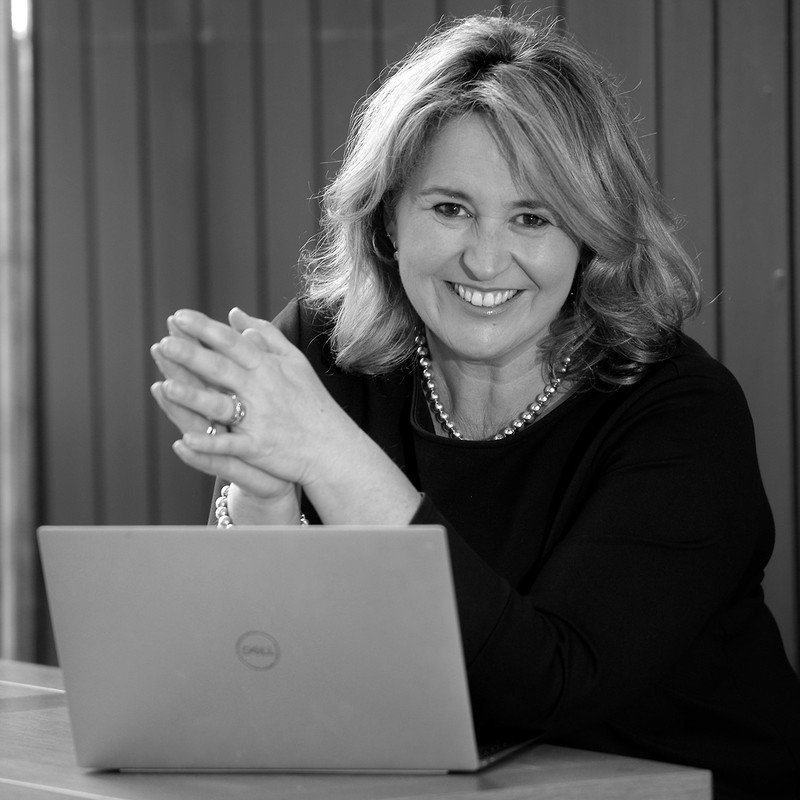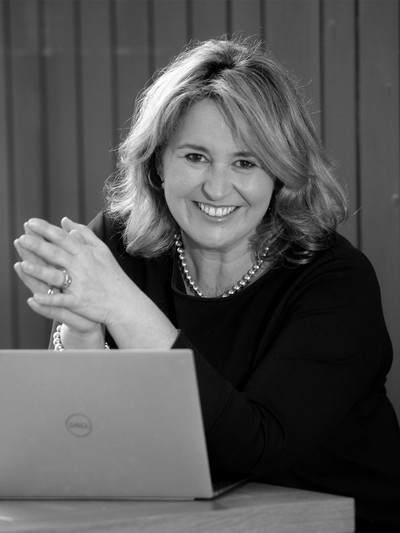

My Business Journey: Joanna Swash
I never went to university. I went to the local comprehensive in North Wales before getting some A levels and leaving during the recession in the late 80s, early 90s. It was a really difficult environment. I just remember feeling desperate to earn some money and get cracking. A lot of companies were cutting back on their training schemes, so I went to work for NatWest as the junior of the juniors. I was processing cheques all day and it was quite boring to be honest. But it was a good lesson in what it meant to start from the bottom – in many ways we’ve forgotten that nothing should be handed to you on a plate. If you want to do well, you have to stand out.
I was very entrepreneurial from a very young age. I remember looking at all these NatWest customers who had big current account balances and asking the manager whether I could I phone them and see if they wanted to open a savings account. Banks weren't selling in those days and I used to stay after work just because it was the right thing to do. I'd invite these customers to put them on a higher interest rate savings account. I didn't know it at the time, but I think that was the start of my sales career.
While I learnt a lot at NatWest, I learned more from working at the local chip shop at 14. I remember it was my second shift, and I was so busy. A woman said to me, ‘it wouldn't hurt to smile’, and that has stuck with me. No matter what kind of customers or how many you have in front of you, customer experience comes from the person that's delivering it. That has been a big part of what's made me who I am, and I wish she knew the impact that she had on me.

After 18 months at NatWest, I applied for a sales role elsewhere. I remember telling them I was going on interviews – which I don’t think people are brave enough to do anymore – but I just thought I had to tell them how it was. I got a job selling typewriter ribbons, which doesn’t sound very glamorous, but it was an international role and led to me living in the US for nearly two years – out on Oyster Bay on Long Island. I was on my own out there but being British was really cool and it was a great experience.
Sales is great because it helps you work to targets. Plus, you’re learning how to deliver what the customer wants. I came back to the UK in 1997 to start my own small business. I brought the US product range into the UK – mainly parts and components for laser printer cartridges, so again, not very exciting but it did teach me a lot about small scale manufacturing. I also experienced all the highs and lows of being a small business owner. Until my son was born.
When my son was six months old, my biggest client hadn't paid me. The dollar rate was going the wrong way, freight prices were getting more expensive and there was a lot of cheap product coming in from the Middle East. My mother said to me, ‘just go and get a proper job for a bit’. Moneypenny was my ‘proper job’ and I'm still here. When I joined the company, I thought I'll be a nightmare employee. I’d had my own business and didn't really want to work for anybody else. But I respected the founders so much and I’m lucky to say I’ve been able to make it on my own over the years.
I always thought they’d find me out sooner rather than later. I was very opinionated and ended up driving to do certain things but that was what they were actually looking for, and it added a lot to the business in its early days. Sometimes people think they’re supposed to be entrepreneurs, but what they’re actually meant to be is a leader. There aren't a lot of people out there that are actually talented managers, so it's about maybe harnessing that side of your personality instead. You can learn to be a leader, but it’s so much better when you can naturally get people to follow you. That said, as a leader you have to learn to support them from the back and say, I'm right behind you, I'm going to keep you safe. You have to set the tone, set the speed and show everybody where they're going.
I found sales easy because I was passionate. I also believed in the product and the service, and so it was always like being more of a matchmaker or problem solver for customers. Eventually, I took on marketing as well – around 2008. Then, I got the CEO job in 2016. From the founder's perspective, and the incumbent managing director, the company was ready to make a change. And the role felt like a natural progression for me – for several reasons. I was the one with all the customer relationships and I was well known among the staff. If I had the ability to keep our people and our clients happy, and I had a management team and investors who trusted me, then I suppose it felt like the right fit.
As a leader, it’s important to let people give you their feedback. If you don’t, that's when you can come across as arrogant. That’s a shame because people lose out on some really valuable information. To be a good CEO, you’ve got to start with basic kindness and respect for the people working for you. Then you have to focus on creating a warm, open environment where people feel free to speak out, whether that's a customer telling you what you're doing well, or your own people saying they love working here or how it could be better.
I also really believe in the power of a network. We all need people who support us. Our co-founder, Rachel, was very supportive over the years – a great sounding board with different ideas and different approaches. I've also been lucky enough to talk to a lot of different people. Sharing problems is one of the easiest ways to solve them and, particularly for women, I think it can help them feel more confident. Men are always more willing to take a risk and women in business need to realise they’re not letting anyone down by not knowing every answer. We have to work harder at helping people to feel like they're free to fail and as though other people have their back.
As women, we’re often preoccupied with making life work. Men do have to make life work but quite often, a lot of the responsibilities do fall to the females in the family. Hopefully that’s getting easier – especially with flexible working – and if women can find the right mentors, then I think they’ll also feel more supported.
/https%3A%2F%2Fsheerluxe.com%2Fsites%2Fsheerluxe%2Ffiles%2Farticles%2F2023%2F08%2Fjoanna-swash-image-2.jpg?itok=CyBvRQWZ)
Mentoring, in my view, is critical. It’s something I've been doing quite a lot, both internally and with external agencies. For example, I'm a school governor at the local comprehensive, and I'm the representative for the business department. We'll go and talk to the students. They've been on trips out to Moneypenny to see how we operate and then I've done wider mentoring as part of things like Be The Business. My best piece of advice if you’re thinking of doing some mentoring is put an end date on it, otherwise one day there'll have to be a tricky conversation where you say, I think we've done enough now. Set a timeframe – say six months to start with – so there's never a need for that conversation to crop up.
We recruit for attitude, not aptitude. We want people who are warm and smiley – typical customer service people. They're probably more sensitive than the average person, so it’s crucial for us to give them a supportive environment in which to do their best work.
Working mothers have to make peace with themselves – otherwise you're going to feel guilty for 15 years. And nobody deserves that. When we're going out to work, and we're leaders of businesses, we're all working to benefit our kids. They’re learning what it is to have a work ethic. Mine are now 19 (Alex) and 16 (Eleanor) and I know they got their work ethic from me. I’m really proud of that, and the fact that they don’t expect something for nothing. I’m the girl from the chippy who’s gone to being on the Prime Minister's Business Council through sheer hard graft.
Going back to work or starting a new chapter is all about setting your direction. I would start by asking yourself, what kind of lifestyle do you want to lead? Do you want to be inside or do you want to be outside? Do you want to be with your grandchildren every afternoon? Or do you not mind not being there all the time? It’s not necessarily a career choice, you can make a lifestyle choice at this stage of life. Then ask yourself, do you have to be your own boss to make that lifestyle work? Can you get it by working for somebody else? Do you want to be in an office all day? Do you want to travel? Sometimes we look at the job as opposed to the lifestyle that it can deliver.
If I could tell my 25-year-old self anything, it would be, you're not going to fail. Many times over the years, I've been driven by a fear of failure. Now, what drives me is my self belief. There was a time when I first took over as CEO at Moneypenny and I’d drive in and look at the big office building thinking, my job is to make this successful. It was very daunting but sometimes we just need to take a step back and look at how far we've come. Whatever you’re doing now, it’s incredible.
What my working life has taught me is that I'm more capable than I think I am. I’ve learnt to push myself because I know I want to take to the next step. You've just got to work hard. I never thought I’d be held back because of background, because of school or because of the fact I was the girl from North Wales working in the chip shop. And I’m so glad I didn’t. You just have to decide on where it is that you're going, and keep your eyes focused on that, because if you work hard enough, you'll get there.
Moneypenny looks after customer service for thousands of businesses across the UK and the US –offering everything from call answering and live chat to responding to inbound queries, proactively engaging with enquiries and customers, booking appointments, managing social media accounts, overseeing reviews platforms, as well as payment handling, ID verification and order processing. Visit Moneypenny.com for more information.
DISCLAIMER: We endeavour to always credit the correct original source of every image we use. If you think a credit may be incorrect, please contact us at info@sheerluxe.com.

